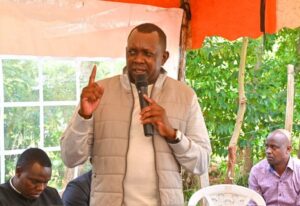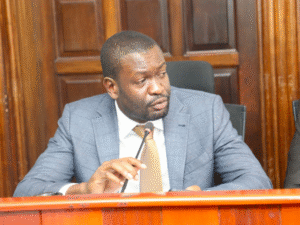
Willis Otieno Criticizes Leadership for Ongoing Hardships in North-Eastern Counties

Willis Otieno Criticizes Leadership for Ongoing Hardships in North-Eastern Counties

Political commentator and constitutional lawyer Willis Evans Otieno has criticized the leadership in Kenya’s Northern Frontier counties for the ongoing hardships faced by residents. He stated that devolution funds intended to enhance living conditions have been mismanaged for over a decade.
Otieno made these comments during the 2025 Devolution Conference in Homa Bay, which focused on the theme “For the People, For Prosperity: Devolution as a Catalyst for Equity, Inclusion and Social Justice.”
Using his social media platform, Otieno emphasized the struggles of communities in the North, noting that billions of shillings allocated through devolution over the past 12 years have not led to improvements in access to clean water, education, or food security. He stated, “For 12 years of devolution, billions have flowed to the Northern Frontier counties, yet the people still drink dirty water, study under trees, and die of hunger. Don’t blame Nairobi, and don’t blame history; blame your own leaders. They turned devolution into personal bank accounts, building mansions in Nairobi while their people walk barefoot in the dust. The suffering in the North is not a curse; it is leadership theft.”
Devolution Funds Under Scrutiny
Despite receiving significant resources since 2013, the Northern Frontier counties have seen minimal visible development, raising concerns about governance and accountability. Transparency International’s 2024 Corruption Perceptions Index scored Kenya 32 out of 100, indicating widespread corruption. Otieno argued that while devolution aimed to decentralize power and reduce regional disparities, poor leadership has hindered its success.
“Devolution is Kenya’s most significant governance experiment since independence. It has shown that development can be more responsive, that citizens can have a stronger voice, and that local leadership matters profoundly. But it has also shown that institutions alone cannot deliver justice—only the consistent practice of accountable leadership can,” he added.
Call for Transformative Leadership
Otieno’s critique aligns with the broader conference agenda on transparency, public participation, and effective service delivery. He urged county officials to prioritize community welfare over personal enrichment, emphasizing the need for transformative leadership to address the long-standing neglect and hardships faced by the Northern Frontier counties.





















Post Comment